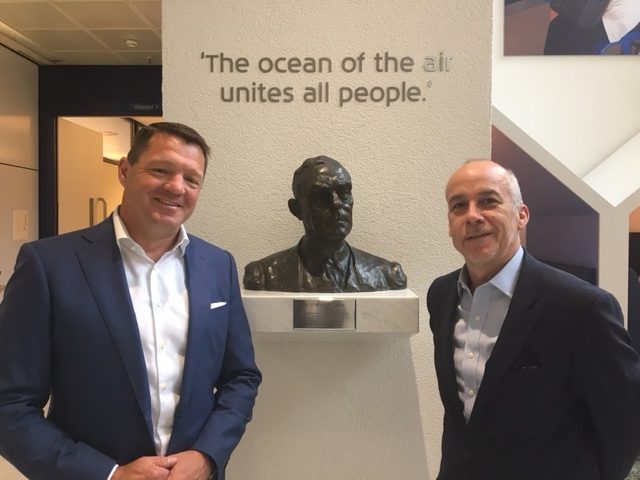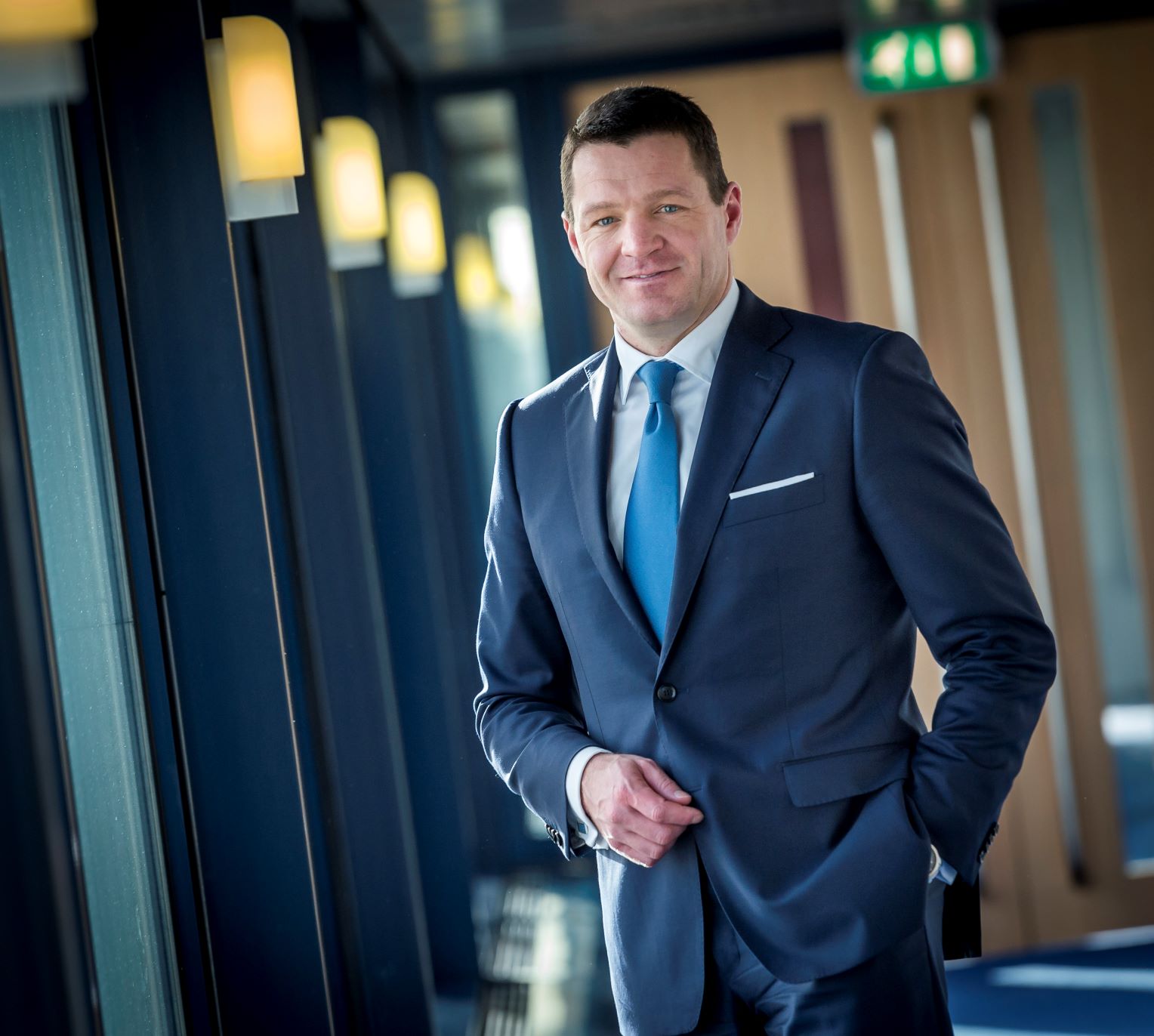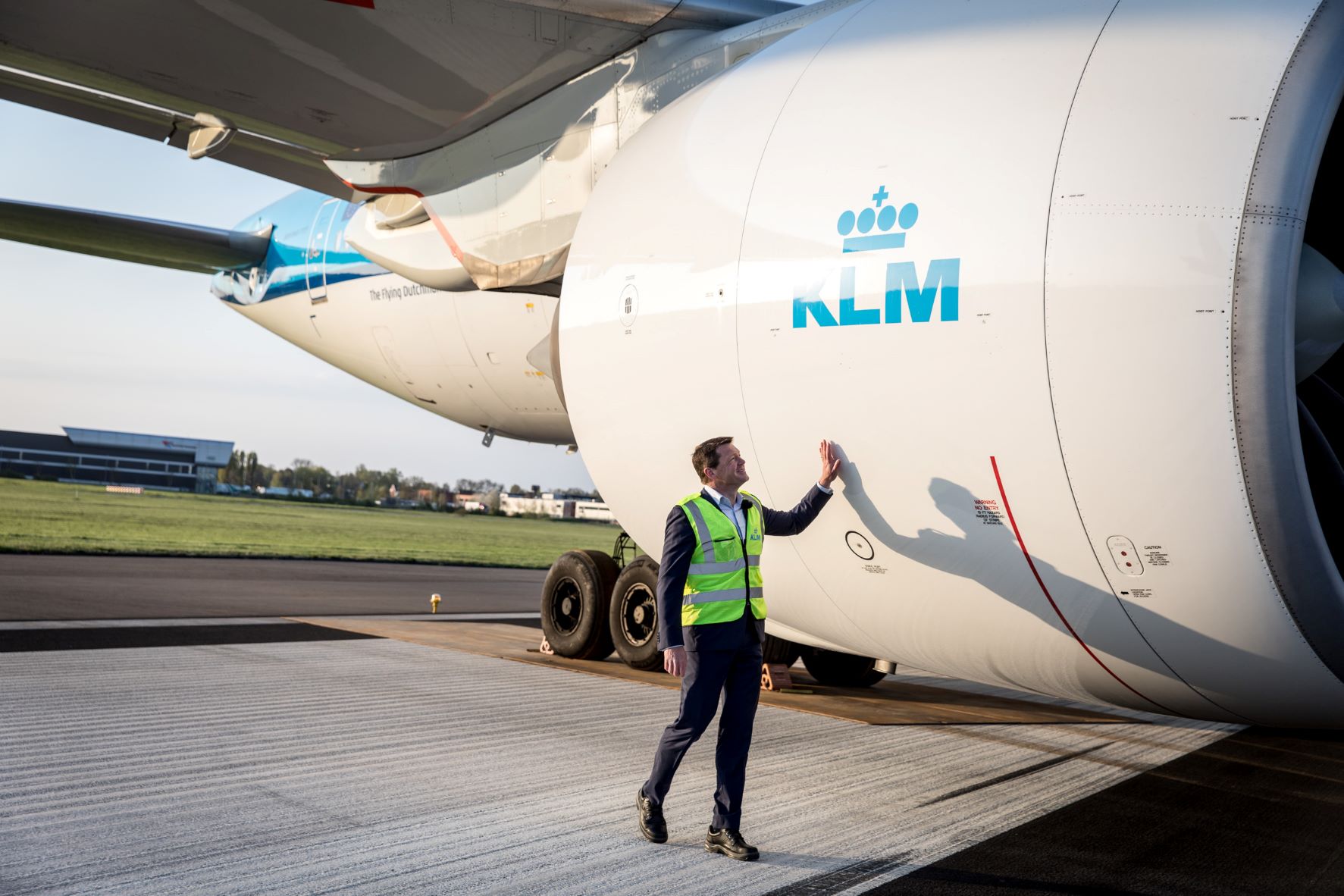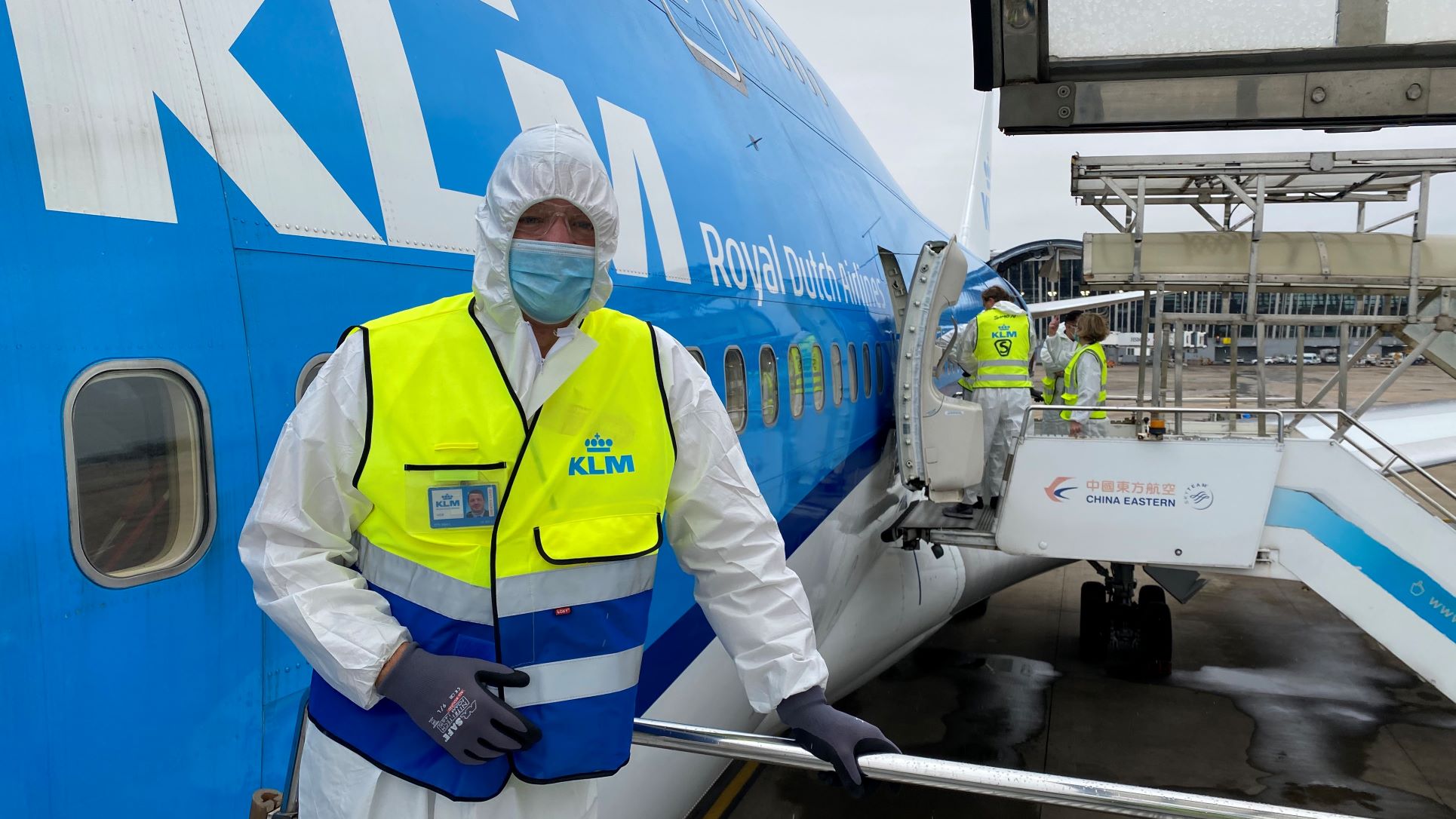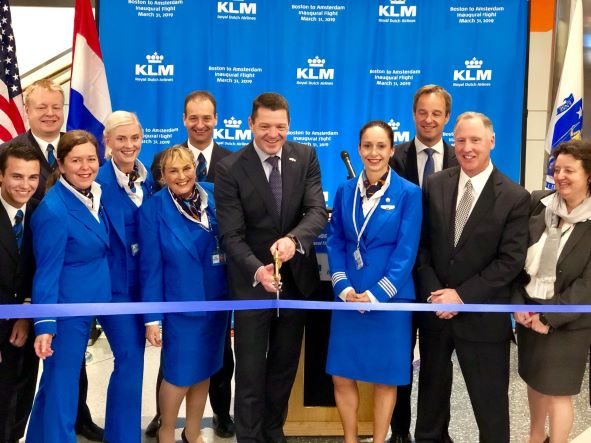By Jeff Peet, Managing Editor of ALA News, from Amsterdam.
1. What is the balance you can make after more than 8 years at KLM?
It is now 8 years indeed at KLM as CEO and a total of 30 years in the company but these last 8 at the helm have three very distinct time-frames for KLM and me.
The first one, between 2014 an 2019, was the lead-up to our 100th KLM anniversary so when I started on 2014 we set a goal. It was a very inspirational one about thriving and being an energetic company. That was the first period of my time here as CEO, with a KLM record number of passengers in 2019 of 35.1 million and almost 10 at Transavia Netherlands, totalling some 45 million customers.
Then the 18 months of the terrible Covid-19 pandemic came. Aviation got hit by the worst crisis since WWII. That was a purely crisis management situation with our fleet grounded and a time that included a lot of restructuring, repatriation flights and medicines flown all over the world.
Finally, I would say the last 18 months have been of recovery. We slowly started recovering in the second half of 2021 and we continued strongly in the first quarter of 2022. During the first three months of 2022, KLM succeeded in generating positive operating results for the third consecutive quarter. There is still a long way to go to full recovery, but the current financial situation means that KLM has started to repay its loan package.
So, if I were to look at the time I have been in this position, those have been three very different phases and, as you can imagine, a lot happened that we could not plan for.
2. What do you consider it to be your greatest achievement at the helm of KLM?
Since I just mentioned to you three very different periods, one could not actually talk about one specific achievement as we did so many things. I may start by saying that we, in the first phase, improved all the metrics such as operational, financial, customer experience and employee satisfaction. Sometimes when you try to make things better in one area, it is detrimental to another but I am very satisfied that we have seen great advances in customer experience with positive feedback, financial performance where we went from 2 to 10% operating margin, a record number of passengers and a very good NPS. All that came when KLM was celebrating its centennial so it created a healthy performance and good atmosphere with customers and staff so I am very proud of that. I enjoyed that a lot and I think that was important to everyone.
After, when the pandemic started, the sense that we are on this together, that we would get through this tough time, that we support each other (and I mean really all of us) and that we managed to continue to fly wherever we could, among other things, were other achievements although a contrast given the situation we were facing.
You cannot compare one achievement to the other but it shows the spirit in our team and that is what gives me the greatest satisfaction and sense of accomplishment.
3. What projects would you have liked to see through had you stayed on as CEO of the world’s oldest airline?
When you get involved in aviation it is very difficult if not impossible to leave. In my case, I started ramp handling in 1992 and I never thought I would be where I am now. This company has given wonderful opportunities. Working in Greece, working in Japan and everywhere I have gone, with truly fantastic colleagues.
It has been a great journey and serving the last 8 years as CEO, is part of that. Then -the Supervisory Board, decided, in good consultation with me- that we will move on after 8 years at the helm of KLM. For me it is good timing as I am 52 and still full of energy and ready for another challenge.
Of course, I think the recovery after the pandemic is not completely finished yet and if I go back to the three stages I described to you earlier, the final one is going in the right direction but we are not fully yet there. I could have completed that one but I am certain that the team here, my colleagues, will be able to take KLM to the next level as we have always done as a company. At the end of the day we all stand on the shoulders of our predecessors and continue to build on that.
4. What do you think is the greatest challenge that the airline business faces ahead?
If we take a step back to when the Covid-19 pandemic started, there were some reflections on the aviation industry. Questions like “will we still fly?”, “how will it develop?”, “how long will it take to come back?”, “will people change their behavior?” and “will it all be different?”, arose, just to give a few examples. However the reality today, two and a half years after, is that people still want to travel and that there is actually no less desire to do so. On the contrary, when you look at the busy realities today at airports all over Europe, people can’t wait to get back in the air.
I think, to some extent, the pandemic has accelerated some trends that were there before it. One of them is the whole topic about sustainability which was already very present and is even more so now.
Then there are challenges that are always present in aviation. The price of fuel can be and is high now, but it can be low again. I mean, we know that that price fluctuates and now we have high inflation but we have experienced that in the past. There are some debt levels that need to be paid but that is all business we as an industry know how to deal with and so on.
Now returning to the sustainability issue to some extent it is of a magnitude and complexity we had not seen before. That is why I see the pandemic as an accelerator of underlying trends rather than as something that has changed the aviation industry completely.
5. Do you believe that the sustainability goals that the industry has set for the future -for example, net zero by 2050- are doable?
A lot has to happen and we do not have all the answers yet. Today, in 2022 if someone were to ask me “do we know precisely with all the intermediate steps that need to be taken, how are all the goals going to be achieved?” the answer to that is that we do not. What we do know is the enormous commitment to make it happen. As an airline, we are not producing fuel or building aircraft but we are working closely together with those who are doing that. Specifically for KLM, sustainability has always been high on the agenda and that is why we have been in the DOW Jones Sustainability Index for the last 15 years. We were also one of the first airlines flying on bio fuels and we have a whole range of programmes. More recently and this is fantastic, in the midst of Covid at KLM we mobilized a group of people who call themselves the “bold movers” and who come from different departments within the company. These people created a global Sustainable Flight Challenge inspired by the famous London-Melbourne Air Race of 1934, which aimed to expand global access to the world and connect people with one another. Long-distance flights are no longer a challenge to the air transport industry, but sustainability presents a new frontier. This idea was presented to the board and we embraced it – I personally love it – and I talked about it to SkyTeam. They immediately adopted the idea and organized the challenge amongst 16 of their airline members. KLM flew a medium haul flight from Amsterdam to Porto in Portugal. I joined the long haul flight to Edmonton in Canada and the spirit on board that flight was terrific. Later this year a winner will be picked and we will share all data and implemented sustainable measures with each other. By sharing this knowledge, everybody wins.
We used 39% SAF which was a first for such a long flight and that just mobilized everybody including air traffic controllers, fuel suppliers and caterers. By telling you all this, what I am underlying is that there is a target for 2050 and we do not have all the elements on how we will get there but the energy, the momentum and the spirit exist and that gives me all the confidence that we will get there, step by step.
6. What sustainability goal should be at the top of the agenda for the future and which one do you believe will be the most difficult to achieve?
When it comes to sustainability there are a couple of elements linked to it and I would like to talk about this issue not just as a purely environmental goal. Environmental goals are extremely important. What we do on particles, on CO2, etc., is crucial but sustainability is larger than that. What you are adding to society and what societal, cultural and economic roles you are playing are key. It is the fun part of being the oldest airline in the world under the same name. When Albert Plesman created this company back in 1919, his philosophy (and we recently reinstated it) was “The ocean of the air unites all people”. Also, the idea (phrased by Tony Tyler) that aviation, is a force for good, is still valid and represents the societal role in fields such as the economy and in education where we have one of the largest educational institutions in Europe. There you can see boys and girls that have an ambition and who want to have a career in this industry. For example 4,000 colleagues are working in our technical departments who attract talent, working with new materials, composite for example, improving engines. This societal role is a mix of things. Yes, we must reduce our ecological footprint but we also need to embrace other aspects that aviation brings to people. I think we should look at the speed we can reduce CO2 without losing sight of other improvements that need to be made.
7. As part of KLM’s voluntary SAF initiative, 10% will be incorporated on all of its flights by 2030. Is that enough or do you expect that percentage to be increased?
As of today, that goal is super ambitious but I wish to avoid coming into a competition on who is setting the highest target as it is not about that but rather who and what is being done. Since last January KLM and Air France, because we do this together as a group, in all flights have a mandatory 0.5% SAF. All these elements will help us to achieve our goals faster. Two or three years ago, we were in a bit of a vicious circle as there was no demand for SAF and it was expensive. Nowadays thanks to the commitments we have, multi-billion investments are being made and they make sense because producers know that there is a market out there and that was not the case just a few years ago. Throughout Covid we have seen commitments, we learnt to do things differently and that has accelerated our pace. That will help us achieve the goals we have set out.
8. What is the greatest lesson learnt from the Covid-19 pandemic for airlines?
The greatest lesson that this pandemic has taught us is the great resilience of the industry and by that I mean of all the people involved in it. Customers who want to fly and who have come back. Resilience has also generated creativity. For example, we operated more than hundred cargo-in-cabin flights. We reintroduced our 747s to fly to China to get medical supplies and equipment here. We saw employees working from home, calling customers and serving them. We also changed our planning procedures due to the fact that, for example, our crews had a tough time staying over at different stations. There were even some passengers willing to fly completely wrapped in plastic. All of that is because we are resilient. Tough measures reduced travel but what we saw is that you cannot stop this industry. I also think that we worked through the pandemic really well together with airports. The latter seems to be changing now. The fact that for instance Schiphol airport is raising tariffs by 37% in the next three years… Our customers can choose from 200 airlines but we cannot move our fleet from one airport to another and we must be competitive. Unfortunately, I see that some of the old patterns are coming back at some places and Schiphol is one of them.
9. Airlines, airports and civil aviation authorities have perhaps come together as never before due to the greatest crisis that the industry has experienced in its history. There has been a need to act in a very coordinated manner. Do you see that reality staying as part of a business model for the future?
Some airports understood that but others have taken a different approach. My philosophy during Covid was wherever we can fly in terms of regulations we fly, provided we cover our arrival costs. We had weekly crisis meetings and in many places in the world we were one of the only ones to continue to fly. It was so important that we did not stop flying to Athens, to Houston, to Manila, etc. That led to mutual recognition from us in the air and from those on the ground. There was a sense of loyalty and also of gratitude for keeping the service alive and that has been a source of energy for our local teams.
10. The aviation industry had, in light of the pandemic, to liaise with new interlocutors such as health officials who literally took over airports. Is the airline business more difficult to manage because of that?
Aviation by nature is a global industry. That totally depends on harmonization, similar rules and standardized procedures. At KLM we fly to 70 countries in the world and for us standardization among them is a key element. We are a global business and we need a global approach and that is why IATA and ICAO are so important. In the EU, all 26 countries did different things. At the beginning that might have been understandable as nobody quite knew what to do but in general the outcome was not good. My hope is that in the future international regulations will prevail and that there will be a much more globalised approach.
11. The market share of air cargo saw an incredible growth during the pandemic and in some cases it has been the reason for many airlines to stay in business. Does that mean a change or a new paradigm for the industry?
Clearly with the grounding of so many aircraft, the need for cargo capacity was high and with this high need, the growth of supply and demand led to a rise of cargo fares. Everyone probably expected for this to normalize post Covid but we moved from one cargo capacity and supply and demand to a new one which now is seeing higher levels of inflation and shortages in supply chains. That’s why the cargo market is still very strong. Cargo has proven over many years to be cyclical so I am sure that, at some point and time, things will change again. However, what is important is how you deal with that situation. That is why when cargo capacity was needed, we operated it in cabins and when it was needed in certain routes, we reintroduced our freighters. As recent as last week, we announced for Air France-KLM a strategic partnership with CMA CGM between Air France-KLM to enhance our cargo footprint. So we adopted shorter measures through Covid and now we are taking a more structural approach. If you ask me how will the air cargo market be in ten years from now, that might be something a bit too far to forecast but in the foreseeable future I believe it will remain very important.
12. What is the traffic forecast for 2022 in general and how do you see the recovery of the industry specifically in the Latin American region where KLM has for so long been a key actor?
Latin America has been hit hard by Covid. We all recall the images of the health systems in the region being under a lot of pressure but as quickly as it goes down, it goes up again. What we do see for us now is that we are back to more or less the levels we had prior to Covid. We have actually reintroduced in Central and South American all our stations except for Fortaleza. We have returned to ten destinations in a combined fashion of almost 50 flights per week. At the beginning of the pandemic some of the forecasts showed it would take as long as 2024 to recover demand. Well that is not the case in Latin America where we see a vibrant market. KLM together with Air France have a strong position in the region and I am very comfortable with us being back. Our service has returned to almost all destinations with daily flights and some of them combined like Buenos Aires-Santiago and Quito-Guayaquil and Bogotá-Cartagena.
13. How do you see the aviation industry in the next decade in general and in Latin America in particular?
The aviation industry is one of fluctuations and it is cyclical as we saw it in Latin America but also in Europe and across the Atlantic. As quick as it can go down it can go up again. At the beginning of the pandemic, all the projections – I personally like the one from EUROCONTROL because they provide excellent reports and industry insights – showed that the point of recovery was being pushed for next year, or 2024 or even further into 2025. In reality, things are happening faster and in the next decade the demand for travel and mobility will continue to grow. People will want to fly more so the challenge in terms of sustainability will increase and so will the need to use digital technologies. That is the reason why our focus has been to run a great airline for our customers, underline our societal role in terms of footprint but also in what we do for the whole of society and incorporate technology to enhance and improve our operation.
14. At the last edition of the Air Transport Awards you were recognized as the industry’s ‘Leader of the Year’. I know it can be hard to speak of oneself but, if you could, what skills that make a leader have been part of your own leadership style at KLM?
In general, I like to work with some inspirational quotes and elements and one of them is of Confucius. It says something like “wherever you go, go with all your heart” so when I speak with new hires or new management trainees, this is something I use every now and then.
At the end of the day, there is no magic stick you can use. It is all about hard work, perseverance, commitment, dedication, energy and all of that is different in every person. So the closer you are to yourself and the more you put your entire soul into something, the better and that has served me well. My philosophy is what I just said: “wherever you go, go with your heart”. I have always done everything in my career following that principle.
15. Beyond the limitations that the Russian invasion of Ukraine has meant in terms of closure of the airspace, do you see any other repercussions because of this grave conflict for the future of the industry?
This is foremost a humanitarian disaster and it is terrible to see it unfold. On the long term repercussions, I think it is a little too early to judge. Today we see the rise in the price of fuel, the need to circumnavigate due to airspace limitations and to respond the best we can to the humanitarian crisis. That is where our efforts should be. As for the long term, I am not in a position to have a say on that.
16. Finally, do you have any last thoughts that you would like to share with our readers?
Aviation once again and it has been the case throughout history has endured a crisis and we have overcome it. KLM, having been founded the year after the First World War, is proof of that. The vision of Plesman back then and so short after conflict was that aircraft can do good for society and I believe that. The Chicago Convention agreed in 1944, the year another world conflict ended and now Covid, that is another crisis, continue to show that aviation is an element of recovery. It can be a war or a pandemic, yet regardless of the operational challenges that we are still facing, we continue to see such desire of people to travel, such wish for mobility and that cannot be easily replaced. We have to do things in a more sustainable way, maybe even differently but aviation is a business and an industry with a future and it is up to us how we define it.

